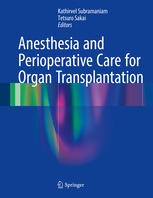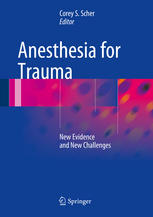Anesthesia and Perioperative Care for Organ Transplantation
د.إ785.00 Original price was: د.إ785.00.د.إ350.00Current price is: د.إ350.00.
Colour Matt Finshed
“Anesthesia and Perioperative Care for Organ Transplantation” is a specialized area of anesthesiology that focuses on providing anesthesia care and comprehensive perioperative management for patients undergoing organ transplantation procedures. Organ transplants are critical, life-saving surgeries that require a specialized approach to anesthesia and perioperative care. Here are key aspects of anesthesia and perioperative care for organ transplantation:
1. Patient Assessment:
- Anesthesiologists perform thorough preoperative assessments, taking into account the patient’s medical history, the type of organ transplantation, and any specific considerations related to the transplant procedure.
2. Organ Selection:
- Different organs, such as the heart, liver, kidney, lung, or pancreas, require unique considerations and anesthesia plans. The choice of organ affects the anesthetic approach.
3. Donor and Recipient Care:
- Anesthesia providers may be involved in the care of both the organ donor and the transplant recipient. Coordination between the two teams is crucial for successful transplantation.
4. Anesthetic Techniques:
- The choice of anesthetic technique can vary based on the organ being transplanted, the patient’s condition, and the surgeon’s preferences. General anesthesia is commonly used, but regional techniques may also be employed.
5. Invasive Monitoring:
- Due to the potential for hemodynamic instability during transplantation, invasive monitoring of blood pressure, central venous pressure, and arterial blood gases may be necessary.
6. Hemodynamic Management:
- Maintaining stable hemodynamics is essential, as transplantation surgeries can involve significant blood loss, fluid shifts, and potential hemodynamic fluctuations.
7. Coagulation and Blood Products:
- Coagulation status is carefully managed, and blood products may be administered as needed to correct coagulopathies. Fresh frozen plasma and platelet transfusions may be required.
8. Immunosuppression Induction:
- For recipients, the induction and maintenance of immunosuppression are vital to prevent organ rejection. Anesthesia providers collaborate with the transplant team to ensure appropriate drug administration.
9. Intraoperative Assessment:
- Intraoperative assessment of organ perfusion, function, and viability is performed to guide surgical decisions and optimize organ preservation.
10. Transplantation Team Collaboration: – Close collaboration with the surgical team, transplant surgeons, transplant coordinators, and perfusionists is essential to ensure coordinated care throughout the transplantation process.
11. Postoperative Care: – Anesthesia providers may be involved in postoperative pain management and the immediate care of transplant recipients in the recovery room or intensive care unit.
12. Complications and Emergencies: – Anesthesia providers are trained to manage potential complications, such as graft dysfunction, bleeding, hypotension, and anaphylactic reactions, that can occur during organ transplantation.
13. Advances in Transplantation: – The field of organ transplantation continues to evolve with new surgical techniques, organ preservation methods, and immunosuppressive medications. Anesthesia providers need to stay current with these advances.
Anesthesia and perioperative care for organ transplantation require a high level of expertise and collaboration with a multidisciplinary team. Anesthesia providers play a crucial role in optimizing patient care, ensuring the safety and success of these life-changing surgeries. Their specialized knowledge and skills are vital in achieving the best possible outcomes for patients undergoing organ transplantation.
Only logged in customers who have purchased this product may leave a review.
Related products
Anesthesia Books
Anesthesia Books
Anesthesia Books
Anesthesia Books
Anesthesia Books
Anesthesia Books












Reviews
There are no reviews yet.